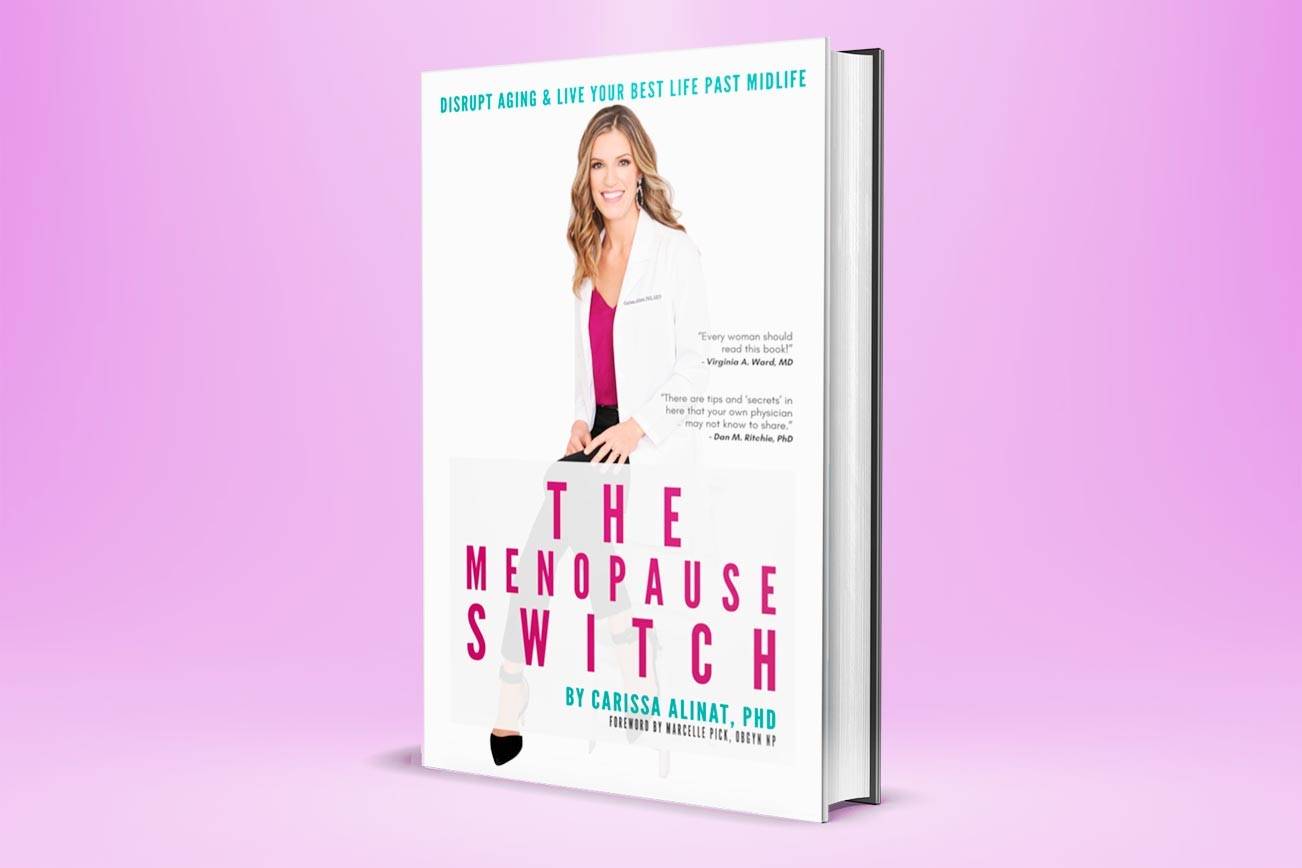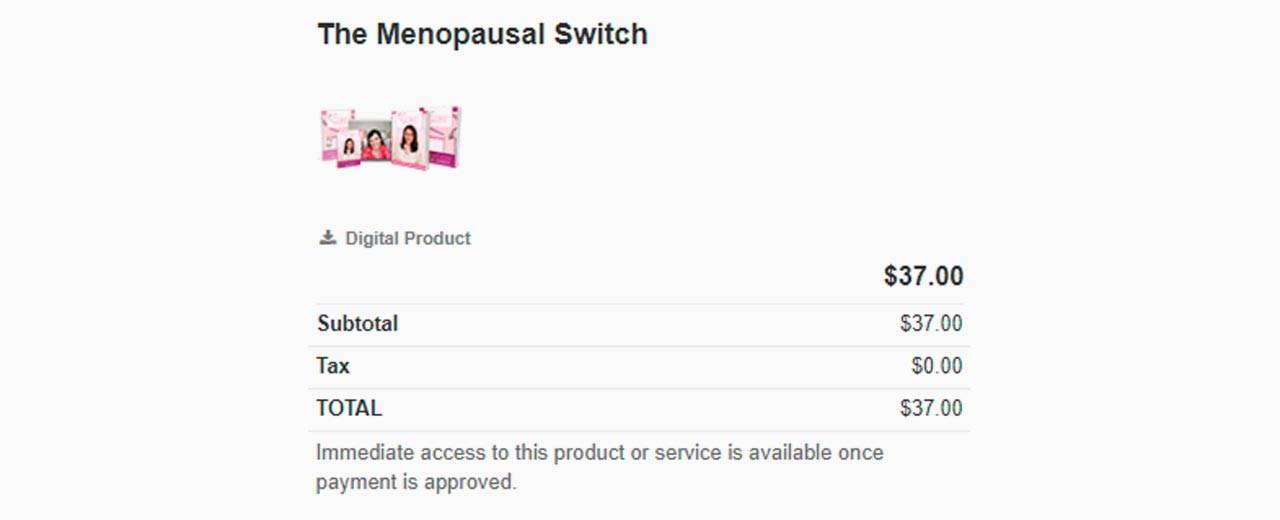In a recent video presentation, leading weight loss expert Deborah Murtagh revealed how she beat menopause weight gain. In fact, she claims to have kept peri-menopausal weight as low as possible at the age of 47, and the journey supposedly entailed following the same diet. For women out there who have been simply advised to “get more exercise, get more sleep, eat healthier or even undergo expensive hormone therapy,” Deborah believes these either do not suffice or lead women into a dark tunnel with no way out.
She further noted that the latter simply dismisses “the biggest reason women struggle with menopausal weight gain.” What is the mystery behind this allegedly later stage in life? How did Deborah overcome the root cause for such weight gain? Here’s everything that we gathered on a system she calls “The Menopausal Switch.”
What is the Menopausal Switch?
The Menopausal Switch is Deborah’s latest program designed with menopausal women in mind. By combining healthy diets, proven mind hacks, and science, she insists that women can lose up to 21lbs in 21 days. This step-by-step guide focuses on what truly works for women and by no means encourages fad diets. Interestingly, the expert split the program into three phases, each lasting 7 to 14 days depending on how much work is required on a case-by-case basis. Above all, the Menopausal Switch promotes weight loss and boosts the immune system, thyroid system, metabolism, and cleaner fat-burning. How are these benefits attainable? Well, it really boils down to the foundation of the Menopausal Switch.
What root cause is the Menopausal Switch trying to reverse?
The root cause was that the Menopausal Switch was compiled to reverse the stress. Deborah goes on to explain that stress activates our flight or fight mode. This prepares the body to release chemicals toward our extremities, i.e., by stimulating glucose production. Our insulin hormone is the ultimate regulator of glucose and is mainly responsible for transporting it to our cells and organs. Unfortunately, the unused portion ends up stored as fat. While such storage may serve a greater purpose later, the fat rate is much higher than glucose expenditure.
A question that might be lingering in the back of one’s mind is, “well, can’t we control our stress levels?” The short answer is yes, and the long answer is maybe. Why maybe? Well, as much as we do have stress under control, the rate at which fat is stored is yet another factor that needs suppressing. For the latter reason, and the influence of hunger cries and cravings, a lot of blood sugar ends up making its way to the bloodstream. This forces the pancreas to release more insulin, and eventually, cells simply stop responding to insulin’s constant bickering about glucose supply.
From the pancreas’ viewpoint, cells’ act of ignoring is taken as failing to recognize insulin presence, and so, the former works harder and harder to release more insulin. This process gives rise to the popularly termed “insulin resistance.” Clearly, one issue paved the path for another, and this is usually exhibited through symptoms including exhaustion, increased hunger, brain inflammation, and weight gain.
Deborah strongly believes that the hypothalamus needs to be stimulated to rectify the aforesaid consequences because it maintains hormonal balance and keeps other bodily functions in check (i.e., ovaries, adrenals, thyroid, etc.). After some 20 years of research, the expert asserts that the ketogenic diet is the way to go that way, glucose dependence can become something of the past, and so will menopausal weight gain.
If the Menopausal Switch Relies on Keto, Why Not Follow An Ordinary Keto Diet?
It turns out that 1) not all keto diets are made equally, and 2) none of the existing keto diets consider menopausal women, which together gives the Menopausal Switch a competitive advantage. In fact, women will be introduced to:
- Principle #1: Fat cycling, a process that involves remaining in ketosis while switching between dietary fats and fat storage
- Principle #2: Intermittent fasting and how its implementation can help to reduce glycogen and glucose levels and increase ketones to new heights
- Ways to use the keto diet to fall in love with food again
- Easy-to-follow diets that do not lead to deprivation and consider the effects of menopause
- Foods that release “feel good” hormones, in turn, counterbalancing stress hormones
How has the Menopausal Switch been structured?
The entire program has been structured in three phases, and as mentioned earlier in this piece, each will last anywhere between 7 and 14 days. As for the phases, they include:
Phase 1: The Menopausal Switch
The first phase involves switching the body into “fat-burning mode.” Though considered a gradual process, the benefits allegedly outweigh the time. For instance, time is given to women who need to adjust to the recommended changes and take control over the addiction to negative sources of food. Within the first 7 to 14 days, results such as weight loss, increased energy levels, mental clarity, and improved sleep may be experienced.
Phase 2: The Fat Release
As the name of the second phase suggests, it involves directing the body towards burning fat for fuel rather than carbohydrates. This naturally implies a gradual shrinkage in the fat storage that has been accumulating over the course of time. To simplify things, the fat-releasing stage is also known as the metabolic state of ketosis.
Phase 3: The Butterfly Phase
At this point in the program, women will see a drastic change in their body composition, mental function, skin health, and confidence levels. Think of it as a caterpillar finally breaking free from its cocoon and facing the world as a butterfly.
How much does the Menopausal Switch cost?
The Menopausal Switch is currently offered at USD$37. This includes a quick start guide, the main program, a summary of eight actionable steps that everyone should be following, a weight-loss food diary, weight loss fat tracker, recipes
Meet Deborah Murtagh
Deborah Murtagh is widely known as one of the world’s leading mind-before-body weight loss coaches on a mission to help change people’s lives. Whether the goal is to lose weight or to improve wellness, Deborah affirms that her decades of research can support any journey. Especially for people who are prone to following yo-yo diets, binge eating, or self-sabotaging, Deborah vouches to help transform one’s habits into healthier ones. To discover how else Deborah might be able to contribute towards one’s journey, click here>>>.
Final Verdict
In summary, the Menopausal Switch is a program premeditated to help menopausal women overcome hindrances to weight loss. Designed and tested by weight loss expert Deborah Murtagh, the founding strategy entails introducing women to the ketogenic diet. By cutting back on the amount of carbohydrates consumed, glucose concentration will decrease, limiting the release of insulin and eventually fat storage. In addition to triggering fat burning for energy purposes, this diet is believed to help the body to better respond to stress. Controlling these two factors alone should trigger weight loss. Not only that, but women can also finally see themselves through positive lens, which at later stages of life becomes a priority. To find out more about the Menopausal Switch, click here>>>.
People Also Read: Best Weight Loss Pills – Review Top Weight Loss Supplements
Affiliate Disclosure:
The links contained in this product review may result in a small commission if you opt to purchase the product recommended at no additional cost to you. This goes towards supporting our research and editorial team and please know we only recommend high quality products.
Disclaimer:
Please understand that any advice or guidelines revealed here are not even remotely a substitute for sound medical advice from a licensed healthcare provider. Make sure to consult with a professional physician before making any purchasing decision if you use medications or have concerns following the review details shared above. Individual results may vary as the statements made regarding these products have not been evaluated by the Food and Drug Administration. The efficacy of these products has not been confirmed by FDA-approved research. These products are not intended to diagnose, treat, cure or prevent any disease.











